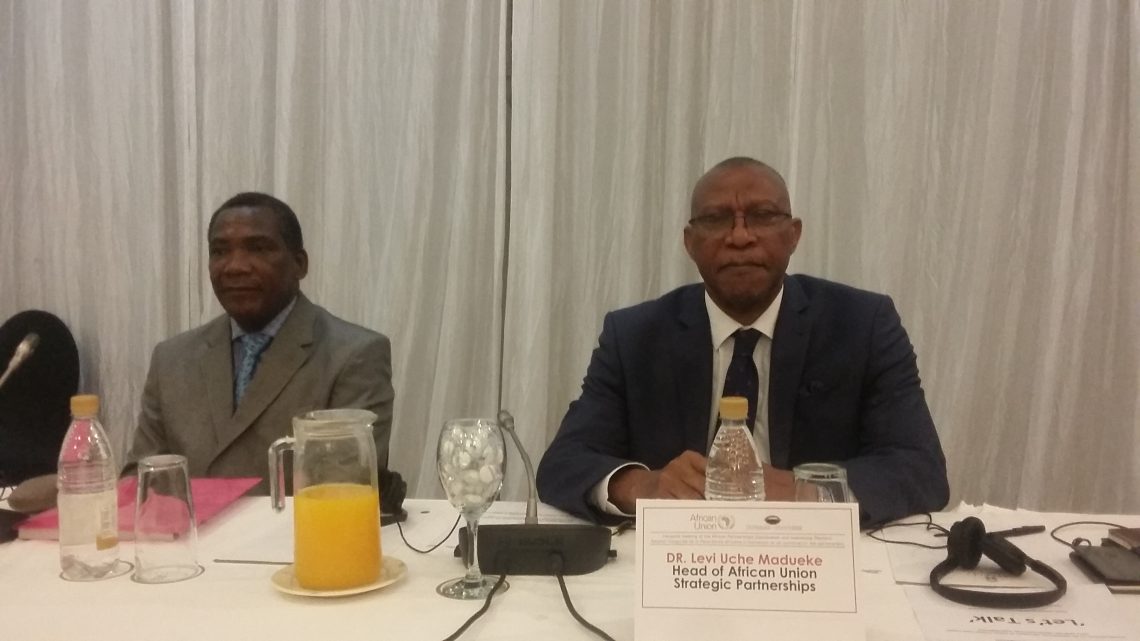By Byron Mutingwende
The African Capacity Building Foundation (ACBF) and the African Union Commission (AUC) have established an interactive network to ensure strategic partnerships to tackle development challenges on the continent.
Speaking at the inaugural meeting of the African Partnership Coordination Platform in Harare on 18 December 2018, Emmanuel Nnadozie, the ACBF Executive Secretary said partnership and coordination is key in tackling development challenges in Africa.
Nnadozie cited a notable growth in the interest in Africa by traditional, new and emerging development partners, over the years. These interests vary depending with the partner, but range from political, social to economical nature. The Africa Growth Opportunity Act (AGOA), Africa-EU Partnership, the Africa-Arab States, the Tokyo International Conference of Africa’s Development (TICAD), Forum on China–Africa Cooperation (FOCAC) and the various bilateral investment treaties (BIT) are a witness of the growing interest and willingness to partner with Africa.
“With the growing interest in the development potential of Africa, and the expansion and fragmentation of the international field of operators, it is important to ensure that these interactions work for the benefit of Africa; cooperation with partners leads to economic diversification and sustainable development in Africa, as well as supporting the continent’s integration into the global economy, as espoused in Agenda 2063.
“However, it has been observed that the key obstacle to Africa’s partnerships is the lack of a coherent strategy towards partners. Africa has not responded to international partners in a well-articulated, comprehensive, coherent and strategic manner. The situation is compounded by lack of coordination and competition between national interest and regional interest hence weakening Africa’s voice in its partnerships,” Nnadozie said.
He said whilst countries may be different, the continent has common development challenges, which are tackled under the auspices of the African Union Strategic Partnerships. However, the growing number of agencies operating in Africa and the multiplicity of coordinating, steering, working committees and groups throughout the African Union system, are increasingly posing serious challenges to the ability of the AU to carry out its overarching international role to ensure effective partnerships for Africa’s development.
He bemoaned the fragmented approach to international partnerships that has created a leeway for some partners to impose programmes and priorities on the AU that do not come properly structured to systematically address Africa’s challenges.
The ACBF is committed to supporting initiatives that ensure that Africa is better capacitated to progress faster into its development and is working closely with the Leadership, Commissions and Departments of the African Union Commission and especially the Partnership Management and Coordination Division (PMCD), to ensure that the latter effectively spearheads strategic partnerships between the African Union (AU) and its global partners.
Chakurangeyi Mutodza, an official from the ministry of foreign affairs of Zimbabwe said the conference was made with a goal of realizing Africa’s Strategic Partnership that was adopted by the Executive Council in January 2017.
“It is common knowledge that over the years there has been a proliferation of partnership agreements between the African countries such as France and China as well as between Africa and regional groupings like the European Union. While these partnerships have placed Africa at the centre of the global economic discourse, there is need to ensure that the continent derives maximum strategic benefits from them as it endeavours to attain the lofty goals of Agenda 2063,” Mutodza said.
He said the proliferation of the partnerships calls for an African unified and coordinated approach in order to maximize synergies as the implementation of Agenda 2063 progresses. Mutodza said there is need to address the current lack of coordination and synergetic linkages between the partnerships in order to attain the continent’s development and integration agenda.
The AU established the Partnership Management and Coordination Division for the purpose of speeding up and streamlining and harmonizing the strategic partnerships.
“What is now needed in order for the African Union to derive maximum benefits from its strategic partnerships is to develop a clear engagement strategy. In this regard the task of this conference is to establish a platform, which enables all relevant stakeholders to develop a common understanding and a common approach on how Africa can harness the opportunities and address the challenges associated with the strategic partnerships.”
The AU has been grappling with the duplicity and conflicting interests amongst its member states and their partners.
Dr. Levi Uche Madueke, the Head of the African Union Strategic Partnerships office under the Bureau of the Chairperson of the African Union Commission said it was important to accelerate the process of continental development and integration, and where necessary, collaborate with the international community to build greater synergy in pursuit of Africa’s development and to ensure that Africa rightfully plays its role in the global scene.
“As part of the mandate of the African Union, the drive for continental development and integration requires that the continental body builds synergy with the other parts of the world with focus on where maximum mutual benefits would be derivable. It is in this spirit that AU, soon after its establishment began to engage the international community to seek cooperation aimed at advancing the process of achieving its development and integration agenda. This motivation resulted in the establishment of relationships with various international bodies and groups, countries, and continents,” Dr. Madueke said.






